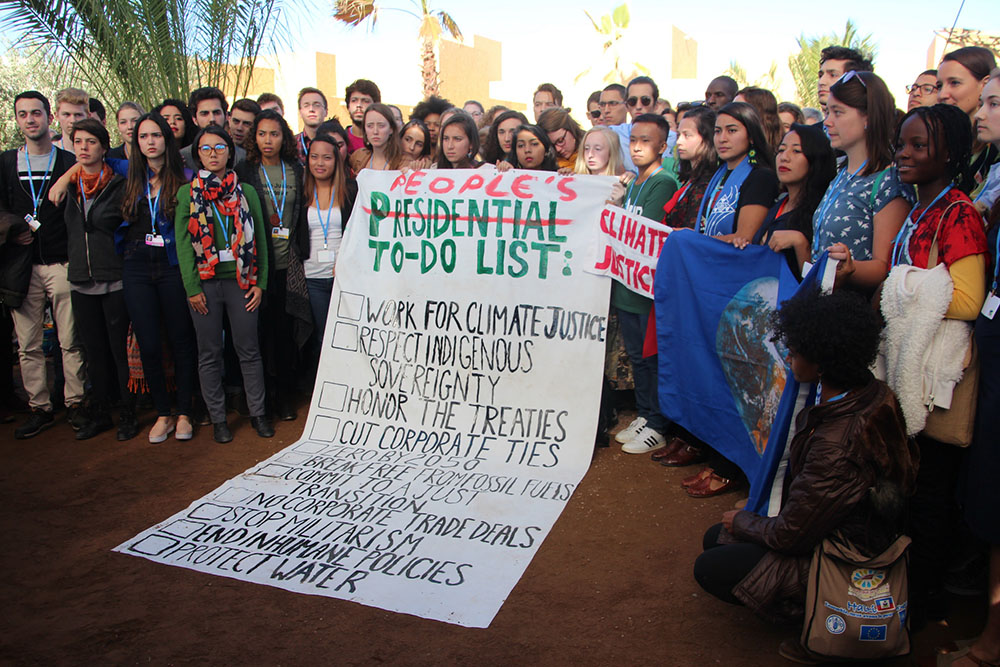
Youths at the UN climate talks in Marrakech, Morocco, respond to the election of Donald Trump as U.S. President. ©John Englart, 2016.
Those concerned about climate change had reason to celebrate this month when the Paris Agreement entered into force as international law on November 4, less than a year after being hammered out by world nations. That optimism, however, was somewhat dampened by the recent election of Donald Trump as U.S. president.
The agreement, which has the lofty (and possibly unreachable) goal of keeping global temperature rise below 2 degrees Celsius of pre-industrial levels, will require nations to curb greenhouse emissions, and provide financial assistance to help developing countries do the same.
Trump has previously indicated he believes human-caused climate change is a hoax and promised to “cancel” the Paris Agreement in a campaign speech on energy policy in May. He has also denounced clean energy policies—which he sees as a threat to American jobs and manufacturing—that would help the United States reach the agreement’s goals.
Considering Trump’s position, world leaders and environmentalists have pondered what effect the upcoming presidency will have on the country’s participation in the agreement. Although speculation varies, there’s reason to believe that the show—both internationally and in the United States—will go on.
One way to do that might be to appeal to the Trump administration as a champion of U.S. business interests, which Secretary of State John Kerry pointed out Wednesday at a United Nations meeting in Morocco where the details of the agreement are being discussed.
“Clean energy is expected to be a multitrillion-dollar market—the largest market the world has ever known,” Kerry is quoted as saying by the Los Angeles Times. “And no nation will do well if it sits on the sidelines, handicapping its new businesses from reaping the benefits of the clean-tech explosion.”
Even if the president-elect decides to ignore the benefits of the growing market, many leaders at the meeting—including those from France, Mexico, and Canada—have indicated they’re willing to impose carbon taxes on the United States.
“A carbon tariff against the United States is an option for us,” Mexico Under Secretary for Environmental Policy Rodolfo Lacy Tamayo told the New York Times Friday. “We will apply any kind of policy necessary to defend the quality of life for our people, to protect our environment, and to protect our industries.”
Although it remains to be seen what such an action would look like, former French president Nicolas Sarkozy urged those at the UN gathering to consider charging a one to three percent tax on U.S. imports into Europe. Other countries could choose heftier penalties.
While the punitive approach is one method of moving ahead with the Paris Agreement sans America (there are others, as well), experts warned Trump might not hesitate to fight back.
“Is he the sort of person who would back down or would he retaliate?” Robert Stavins, the director of Harvard University’s environmental economics program, asked in a New York Times article. “He seems like the kind of person who would retaliate. And then you’d have a trade war.”
As it stands, Trump would likely need to wait until 2020 to formally withdraw the United States from the climate agreement (although his advisors have possibly found a way to pull out in one year—at great diplomatic cost, according to Reuters). Even without withdrawing, the administration could choose to ignore the requirements of the agreement—which isn’t legally binding—without any legal repercussions.
“If a country wants to just walk away from its obligations,” former White House Energy Advisor Jason Bordoff told NPR, “there's little recourse for the rest of the world other than diplomatic pressure, I think.”
That said, other pressures might prove onerous enough to avoid such action. Fallout from nonparticipation could range from angering Americans (including hundreds of major business leaders) to giving competitors such as China a leg up in the clean energy market.
Considering the impact of U.S. disregard on the global ability to meet the targets of the agreement, however, it’s not likely that nations will sit by idly if the administration chooses not to act.
“The Paris Agreement was signed and ratified not by a President, but by the United States itself,” Carroll Muffett of the Center for International Climate Law told The Atlantic. “As a matter of international law, and as a matter of human survival, the nations of the world can, must, and will hold the United States to its climate commitments.”
Jolie Breeden is the lead editor and science communicator for Natural Hazards Center publications. She writes and edits for Research Counts; the Quick Response, Mitigation Matters, Public Health, and Weather Ready Research Award report series; as well as for special projects and publications. Breeden graduated summa cum laude from the University of Colorado Boulder with a bachelor’s degree in journalism.